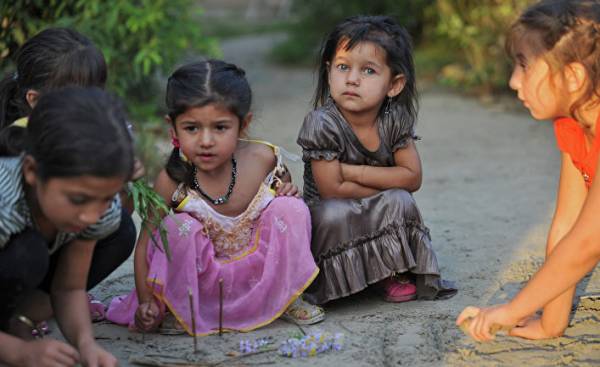
Are currently being developed and written by elected parties. Do they state what this party wants to establish: to reduce taxes, increase pensions, to strengthen the police and so on. In some programs, also it says something about the relationship to the minorities in the country. Most often this can be found under the key word “culture”. Recognized minority in Germany is the Danes, Friesians, Sinti and Roma, and Sorbs. In the coalition agreement of the CDU/CSU (CDU/CSU) and the SPD (SPD) from autumn 2013 reads: “We pledge to continue to support the four national minorities in Germany — Danes, Sorbs, Frisians and German Sinti and Roma and German minority in Denmark, the German minority in the countries of Central, Eastern and South-Eastern Europe and the former republics of the Soviet Union.”
Enishi — an unrecognized minority
One minority, however, is not in the list: enishi. Although we in Germany have developed a highly developed flair for discrimination, and the German Parliament dealing with the problems of discrimination against indigenous peoples and ethnic groups around the world, to find information on the situation for jenisch in Germany is almost impossible; although they are a classic minority.
Their representatives say, at least partially, in their own language and not a regional dialect. They have their own music, its own history of trade and history of suffering, which differs little from the history of the Sinti and Roma.
Enishi are found almost throughout Central and Western Europe, collectively, hundreds of thousands of people, according to the outdated official estimates, in Germany there are at least 10 thousand. But nobody knows for sure. Some experts believe that approximately 400 thousand people in Germany are descendants for jenisch. It’s a lot.
The last time in 2013, the German Parliament returned to the subject for jenisch in response to the short inquiry of the left faction. The faction asked: “does the Federal government recognize the rights for jenisch and to give their language the status of the language of national minorities, as was done in Switzerland?” The government responded: “the Federal government can support organisations and projects only when they have national importance. Developing conditions for cultural life in the Federal Republic of Germany in General, and support for organizations and projects of national importance positively affect the richness of the cultural landscape from which benefit rural areas.”
Insult “dirty Gypsies”
“Rich cultural landscape” manifests itself in a particular case. Josef Keinberger (Josef Kelnberger) wrote a wonderful story about a jenisch in the newspaper Süddeutsche Zeitung. It is worth it to her to read. He describes Alexander Flagler (Alexander Flügler) from Singen (Hohentwiel mountain), 59-year-old entrepreneur with about 100 employees, of which life the others called him “dirty Gypsy”.
Kellenberger called for jenisch neglected. Flagler fighting and work for the sake of his homeland on Jointure received the status of a cultural center for jenisch. First in Germany. Which will also attract public attention, as passed last year in the cinema adaptation of the novel of Robert Domes (Domes Robert) “Fog in August,” (“Nebel im August”) about tesskom boy, Ernst loss, who was killed by the Nazis. The film, God knows, was not a “blockbuster”.
Suspiciously peaceful
Who are these enishi? Where do they live? What do they do? Why we know so little about them? What distinguishes them? I’m writing about for centuries an existing group of people, as mentioned earlier, language and music. With a high probability they appeared when in the late middle ages, the poor, people without a need for knowledge and skills, the impoverished and the persecuted joined with Jewish groups, with the former mercenaries and strangers. They also met with Sinti and Roma, who also moved to Europe.
Then the society most enishi seemed suspicious because they did not conquer territory, not to impose on others their religion and way of life and, consequently, shapes authority. A peaceful people. In turn, the rulers oppressed for jenisch with the help of police, justice and prohibitions, they even outlawed. Their way of life was also ideologically opposite as Roma. Really peaceful people turned into thieves, robbers, people who should be excluded from urban communities.
These people have gained the knowledge, found the tricks, he developed the ability to engage in trade with cloth, utensils, electrical wires and instruments in the country; to repair broken items, patch pots, to produce necessary household items, baskets, and more. They spread the news at the time when the information message has not yet been developed, played music, entertained people, made “Paias”, a straw man, which in some areas and currently symbolically burned after the fair. Then these enishi was what we today call innovation, technological progress. They were not wasteful, do not throw broken things and fix them or find new uses for them, savvy people.
Nerot — the area in Rhineland-Palatinate, which once was the production of goods of wire, especially wire traps. About anisah who produced such goods, on the page dedicated to Narotu, you can find very little on it briefly says: “Often they walked together and talked together on “tesskom”, a secret language that outsiders don’t understand. On tesskom then spoke in the village, today this dialect only remember the elderly”.
“Alien blood” for national socialism
Traditionally for jenisch, who consider themselves a separate people, mistakenly referred to the Gypsies and is confused with Sinti or Roma. The newspaper Spiegel, in 1949, wrote of the inhabitants of Nimule, in the Palatinate the terrain is mostly populated by aniemi: “At the end of the XVIII century on a secluded mill, probably settled a few Gypsies. They were shunned by residents of the area, lived in mud huts, eating fallen cattle, dogs and cats, and very rarely took “someone else’s blood.” Thus arose the settlement of Nimule. 420 residents, of which 100 people is the name of Flickinger, and today talk among themselves in their own language. “Enissey” — reminiscent of the Hebrew Gypsy jargon.
Marriages within the community ensured that the children are struggling from kind. They never knew why they went to the Sacrament, their parents didn’t know it, too. They would not let their children to school and taught them to steal and lie took them with him when at night went to steal potatoes from the fields or when they went to town to sell their berries, brooms and baskets and to take what had been able to grab”. As Spiegel — “assault gun of democracy”, anyone can understand that such proposals were written four years after the end of the field dominance of Nazism.
Dealing with “foreign blood”, the Nazis took literally persecuted for jenisch, arrested, forcibly sterilizability, were transported to concentration camps and killed there. In his ethno-madness and insane way to catalogue the Nazis identified for jenisch to living “according to Gypsy customs.” For people of the ruling class enishi was antisocial, useless eaters, human parasites. Still it is not known exactly how many fell for jenisch their victims.
It was not until the 60-ies of the last century. In the historical collection of the Federal Institute for health protection of consumers and veterinary medicine integrated Healthcare exhibition “of the Reich in the period of national socialism”. There you can find the appropriate instructions Nazi race researcher Robert Ritter (Robert Ritter): “As I have repeatedly stressed in their reports, except for the Roma group of the population, controlled prone to wandering Gypsy crime barons, should be counted in antisocial Enissey nomadic group. As part of our work in the field of criminal-biological and genetic research, in which study Roma represent only part of the problem, our research consistently affect these and other anti-social and criminal group.”
Descendants of tinkerbe in Ireland
Hardly anyone has heard of such a thing. This is because enishi are names from around the world. If they want to, then one day they go unrecognized in the history of minorities in order to go down in history of most. Because they have no external features.
Although most of us don’t know any for jenisch, but their relatives from other countries usually “have a bad reputation”. “Irish Gypsies caused uproar in Bonn,” wrote the Bonn newspaper General-Anzeiger about the events on 11 August 2013. “Tinkery evident in the city, especially young girls. They usually wear very short dresses neon colors”.
Hereinafter, General-Anzeiger: due to his abnormal way of life and live in large family communities tinkery create a stir wherever you go. They appear again and again in the Rhineland with its “luxury residential caravans”. This type of message can be seen in the Hessian Newspapers, and on the Rhine and the Berlin Tagesspiegel, although clans tinterow didn’t start out in Berlin: short neon dresses, abnormal lifestyle, living in family communities, luxury trailers. According to information from the General-Anzeiger in addition, trash, fights, madness, concerned citizens. In February last year in Bonn 40 police released the site of the vagrants near the city. This was attended by firefighters and the judge of the district court. The reason: suspicion of trespassing, destruction of property and theft of a Bicycle.
I’m not prone to conspiracy theories and I know that clans tinterow can act on the nerves until a strong perturbation. But nevertheless fills me with a bad feeling when I read that the numerous representatives of the government with judges and fire protection, which is absolutely not a common phenomenon, forcing the nomads to leave.
Silence for jenisch
Oblivion in the case of eniami is not accidental, it’s not a problem with short-term memory, in this case, oblivion is the equivalent of silence. Silence in the sense that it will take some time and died last enishi who were taken away to the concentration camps of the Nazis. What did government bodies for the Germans was that they were classified in a separate group of victims on the memorial to the murdered Sinti and Roma in Berlin. Fate for jenisch in Germany, in my opinion, is a terrifying indicator of existing cultural gaps and social cleavages.
On the one hand, we have developed a greater sensitivity to infringe upon someone’s interests situations, to discrimination; on the other hand, we’ve destroyed this group of people in the public consciousness. What cultural achievements, which force adaptation stand in the struggle for life and survival for jenisch? It has never been examined.
Today, some enishi as before their parents and grandparents, are engaged in trading second-hand things. And even for them, it is complicated, as the law in the area of secondary use of waste handed over the organization of their collection to local authorities who now decide who has the right to collect iron, rags and paper, and who is not. Enishi, “small collectors” as they are called in the jargon of power, suddenly fell into the millstone of modernization, licensing, accounting, and efficiency.
Many questions and little time
And now again composed of the election program with a lot of plans, and then will be adopted and decisions. Think if this time about anisah? What prevents the next German Parliament to clarify many questions?
Will new Federal President the initiative in this matter? Why cities and communities will not begin the action by which you could set when and how much for jenisch was collected Nazi officials for deportation, forced sterilization and murder in the Third Reich. Why there is no place, which would contain information about anisah? Place against oblivion? Research minorities and discrimination carried out actively in Germany. Why so limited studies on anisah? Who leads them? Time waits for no man.







